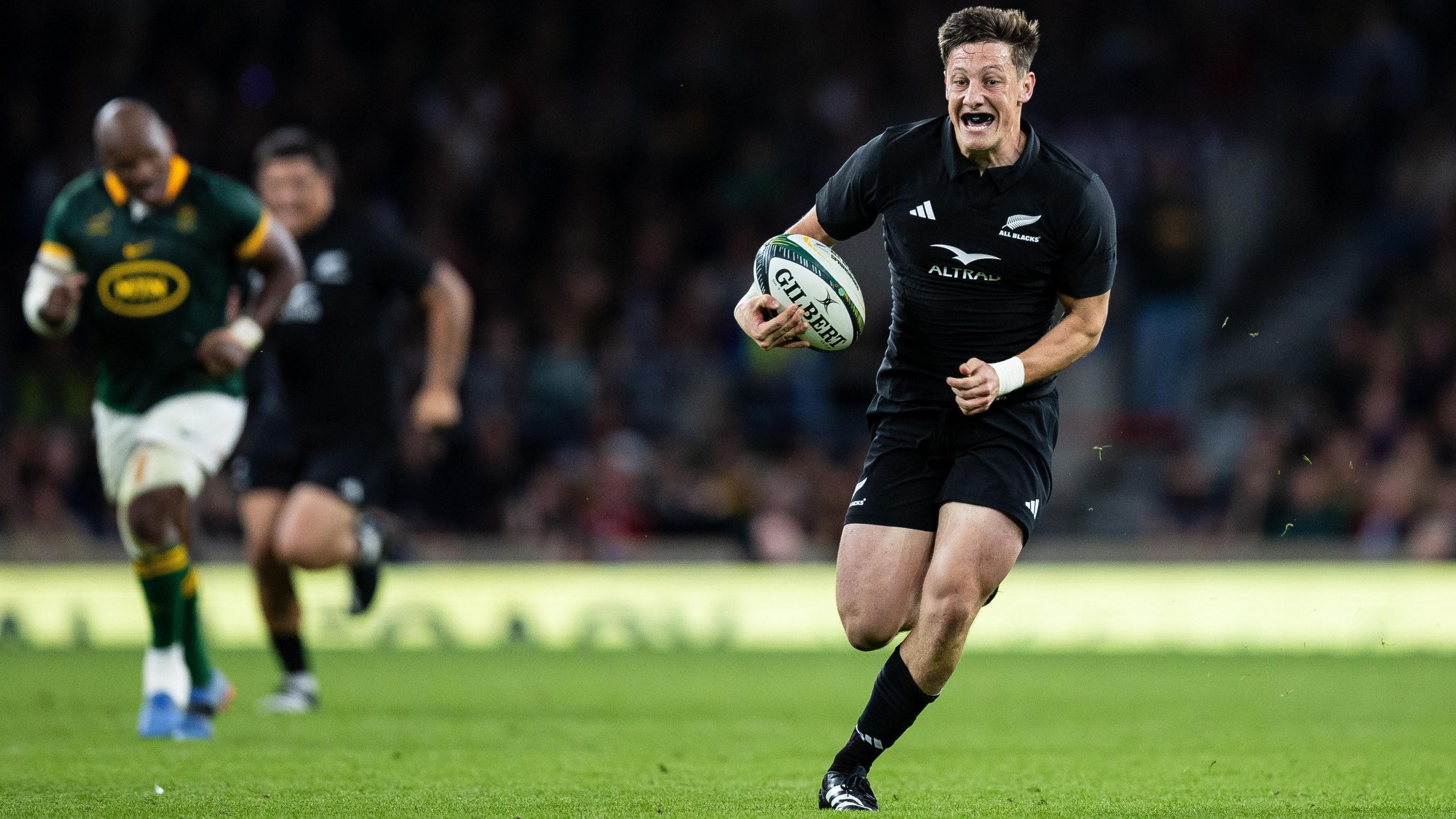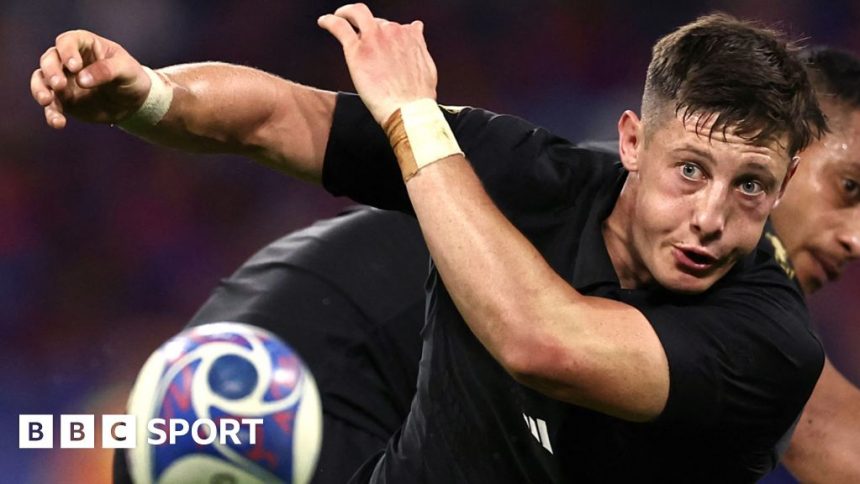‘I could see my kneecap was not where it should be’

Roigard is making the trip to London for the third consecutive autumn after being part of a New Zealand XV who took on the Barbarians in 2022 and the All Blacks friendly defeat by South Africa in 2023
-
Published
Autumn Nations Series: England v New Zealand
Venue: Allianz Stadium, Twickenham Date: Saturday, 2 November Kick-off: 15:10 GMT
Coverage: Listen to live commentary on BBC Radio 5 Sports Extra and BBC Sounds, and follow live text commentary on the BBC Sport website and app.
It is a worrying thing to misplace your kneecap. It isn’t on the usual ‘wallet-phone-keys’ checklist, but, if you can’t locate a patella, it quickly becomes a pressing concern.
On 30 March Cam Roigard looked down and felt the fear.
“Initially I thought it was someone’s knee hitting mine – it felt like a big stinger,” he tells BBC Sport.
“But when I was on the ground, I could see my kneecap was not where it was supposed to be.”
Roigard, in a rich vein of form for the Hurricanes and the heir apparent to the All Black nine jersey, had been tackled by Highlanders’ James Arscott.
There was nothing unusual in their collision, but a coincidence of torsion and tension ruptured Roigard’s patella tendon.
“I knew it was pretty bad,” adds Roigard.
The Hurricanes won 12 out of their 14 regular-season Super Rugby games, but lost in the semi-finals
It had certainly come at a bad time.
With All Black great Aaron Smith retiring after last year’s World Cup, new coach Scott Robertson getting his feet under the table and Roigard having lit up the Super Rugby season, the 23-year-old was presumed by most to be New Zealand’s new first-choice scrum-half.
In a talent pool of such prodigious depths, though, spend some time out of the set-up and you can soon sink without trace.
Forced to rest for a couple of weeks after being sliced, stitched and fixed, Roigard stewed over a prognosis of at least six months out.
“I wouldn’t say I got into a hole, but I guess there are times you feel sorry for yourself, especially early doors after my operation,” he says.
But Roigard has never felt sorry for himself for long.
As a small, slow kid, he had to sharpen his skills to make up the gap on more naturally gifted players.
As an emerging teenage prospect, his local selectors in Waikato still had doubts, thinking Roigard had already maximised his potential and peaked.
Each time, he doubled down. He upped sticks, leaving home to find a new pathway and working harder, in steel mills and on building sites, as well as on the pitch, to prove them wrong.
“When I was really young, I was the smallest,” he remembers.
“I got told pretty early on that I needed to learn to pass off both hands because I wasn’t big enough to run through everyone and wasn’t fast enough to either.
“So having a good skillset was what I thought would set me apart from other kids. That was what I prided myself on, along with my fitness.
“There were certain talent identification people in my home region saying I wasn’t going to get any better when I was 17.
“Those decision and opinions can have a big influence on young kids’ careers, but I was able to push that aside.”
Roigard, small and slight for his age for a long time, was never part of New Zealand’s age-grade pathway
Now 6ft, 13st, strong, with scorching pace, Roigard has conclusively won the argument.
He scored a superb 70m solo try on his last visit to Twickenham – a World Cup warm-up defeat by South Africa – and blazed across the pool stages in France with three hot-stepping tries in as many games.
And now, post-recovery, Roigard believes he is even better.
“Having a lot of time off the field, was a chance to work on some running mechanics – doing drills as I was getting my range back – and that has integrated into my sprint,” he says.
“My technique is better and I’m more efficient at pace, and in the gym a lot stronger in the upper body.”
Never mind his words; his numbers back it up.
His peak sprint speed, external and bench press results, external are up on what he was clocking before the injury. His Bronco time – a shuttle-run fitness test – is almost back to the four minutes 12 seconds he ran to match Beauden Barrett’s All Black all-time record, external back in January.
As he shrugged off Japanese tackles to make a try-scoring Test comeback last weekend, you could see it in the flesh as well.
Roigard made a try-scoring comeback for the All Blacks’ in their 64-19 win over Japan last weekend
Roigard is not all rugby, though. He had two loves as a kid. His father Dave raced cars on speedway’s dirt track circuit. His brother Stefan still does.
And in 2019 an 18-year-old Cam was second in the national championships, external in the saloon category.
As his rugby revved up, his racing career stalled. But Roigard reckons some of the skills have leaked across.
“When you are racing, you have to look ahead, not just at what is in front of you on the nose of your car,” Roigard says.
“There is the peripheral vision, understanding where people are around you, in terms of support and opposition, so you can make good instinctive decisions. You have to be anticipating gaps.
“Not hesitating is something that has transferred over. I like to think that if I take a gap on the race track, it is in the same way I would on the pitch trying to create a line break.”
Roigard took an early dint in the destruction derby of Test rugby, but, patched up and tuned up, he looks set to hit clean air. The rest of the field better beware.
Related topics
-
-
Published5 hours ago
-
-
-
Published20 hours ago
-
-
-
Published2 days ago
-






